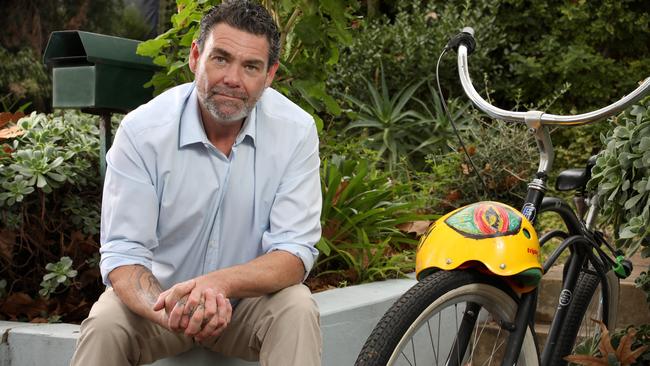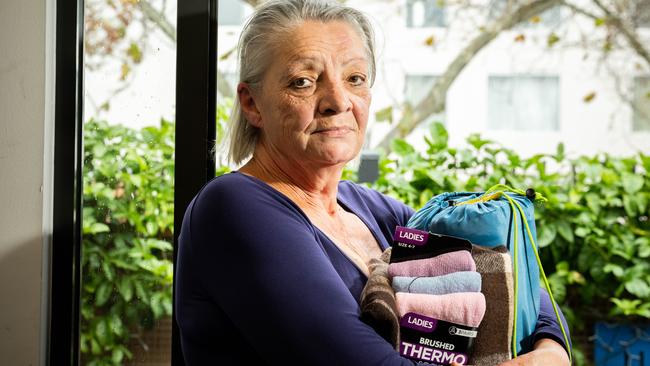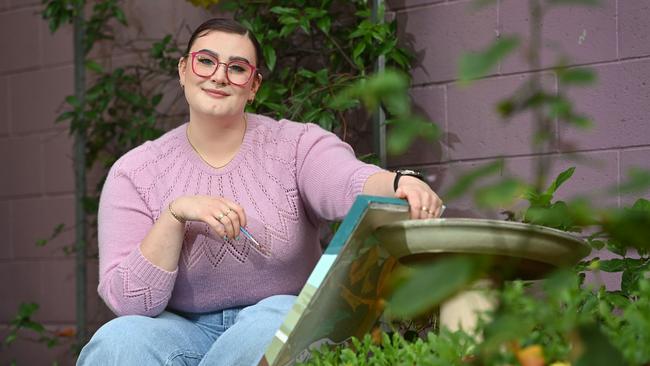Life on the streets during Adelaide’s homeless crisis: Sunday Mail Blanket Appeal
Life on the streets of Adelaide is cold, dangerous and desperately lonely, especially in the depths of winter. Three South Australians share their tales of homelessness.
SA News
Don't miss out on the headlines from SA News. Followed categories will be added to My News.
Christopher is a 49-year-old former crane operator who breaks down in tears as he describes his journey back from sleeping in a tent under the Semaphore Jetty for six months.
Chelsea is a 22-year-old aspiring hairdresser who was on the brink of ending her own life after six years without stable housing.
Mirjana is a 60-year-old grandmother who spent months carting her quilt around the streets of Adelaide, looking for a shelter and a safe place to sleep.
Their lives are just the tip of the iceberg when it comes to telling the big picture of homelessness in South Australia. There are thousands more like them. Each story boasts its own unique elements. But they have one common theme: No-one wants to be homeless.
Some couch surf with friends and family for as long as they can. Then they might live in their cars for a while. And if their luck doesn’t turn, they’ll eventually find themselves sleeping rough, roaming around city streets searching for somewhere dry and safe to put down for the night.
A spiralling rental crisis – fuelled by astronomical cost-of-living increases – is forcing more and more people out of their homes.
Christopher, Chelsea and Mirjana have agreed to tell their story in an effort to raise awareness about this escalating issue, and urge South Australians to get behind the Sunday Mail’s annual Blanket Appeal.
The appeal has been helping homeless South Australians since 1959, and money raised this year will go towards charities the Hutt St Centre and Catherine House.
***

Christopher breaks down in tears when he talks about how the Hutt St Centre and helped turn his life around after years of living either in his car, on the streets or in a tent under the Semaphore jetty.
It’s a cold and drizzly winter’s day when we meet on the footpath near the centre’s entrance, and he volunteers to tell his story so he can help the people who have helped him so much.
Raised on the beaches of California in the US, Christopher met and married an Adelaide girl and moved to South Australia 16 years ago.
The couple have two daughters but the marriage eventually broke down and his life started spiralling out of control when he lost his job at the start of Covid.
He was drinking heavily and for a while he lived with his dog in the car. After a series of traffic infringements later, Christopher lost his licence and found himself “proper homeless”.
When asked to describe how he first came across the Hutt St Centre, he becomes visibly emotional.
“I had come into the Hutt St Centre one day because I was in need,” he says. “I was in need of food. I was in need of shelter. I was in need of support. And I was… I was homeless.”
Tears overflow and Christopher quietly sobs as the Adelaide winter drizzle gets heavier. But then he gathers himself.
“These people are amazing,” he continues as he gestures towards the Hutt St Centre. “They’re angels. They have helped me and I know they have helped a lot of other people.
“They can’t throw enough money at this place… there are so many people that are in need.
“They have helped me become a better person. And helped me become a better man. Because of their help, it’s helped me get back to where I should be.”
Thanks to the Hutt St Centre’s Aspire program, which helps connect people with sustainable housing, employment and community, Christopher now has a permanent home near the CBD.
“They’ve given me a home to stay in,” he said. “They’ve given me… hope. I do not know how or why, I’ve been truly blessed to have been given this opportunity. But I will be sure to give anything back for having my home.
“I could only hope and pray that if there was anyone out there that is or has been through what I’ve been through, they were given the opportunity that I have been given.”
To that end, he urges people to dig deep if they can and donate to the Sunday Mail’s blanket appeal.
“This life is f..king difficult,” he says. “Every one of us can be in the top penthouse in one moment, and then in the next moment, be seen as a filthy bum picking up cigarette butts. That’s life.
“I just want people to open their hearts and to realise that it doesn’t take much to actually get to the bottom.”
Christopher becomes emotional once more when asked to vocalise just how tough it is to live on the streets.
“It’s absolutely f..ked up, man,” he says. “You have no idea how lonely and singular a person is who is living on the streets… You have no idea… The cold…”
And tears replace his words yet again.
***

The loneliness, fears for her safety, cold of winter and heat of summer are the lasting memories of Mirjana’s time sleeping rough in the streets of Adelaide.
The Croatian-born grandmother, who moved to Adelaide with her parents when she was seven, found herself homeless during Covid after her time as a live-in carer for a family friend turned toxic.
Like many, she started her homeless journey couch-surfing, but was always conscious of overstaying her welcome.
“You can’t stay in people’s houses that long because you are invading their privacy as well,” she says.
“They’ve got lives to live as well and you can’t expect them to keep you at the same time. So yeah, my life was spiralling out of control.”
She went from shelter to shelter looking for help as she searched the streets carrying her quilt to find “a little nook and cranny” where she could bed down for the night.
“It’s cold. Very cold. But hot during the summer,” she says. “It’s also very, very… it’s kind of scary, because people are weird – they look at you really weird when you are out there and you’re wary about them.
“Some people are really good – they’ll buy you a bottled drink or something to eat – but a lot of times you’ve got voices constantly around you, and you’re lying there and you think ‘Jeez, what’s going on’.”
Mirjana says the best spots to sleep are under shelter in areas that are not “in the middle of nowhere” but are also not too busy with pedestrian traffic.
“When you first go on the street you look for places like tunnels and similar – where you can have a little area that’s tucked away,” she says.
“If you’re a woman it’s even worse. So you try to make yourself disappear, and in the morning you get up and move quickly so that you don’t get into trouble.
“If you are in the doorway of a private building you can get into a heck of a lot of trouble, so you have to move around.
“Apart from the cold, the worse thing about it was just people looking at your life as though you’re a piece of shit… of them not really caring – you’re just another number, another statistic. It just makes you feel so ‘blah’.”
With the help of Hutt St Centre, Mirjana now has a permanent roof over her head and has reconnected with her three children and two grandchildren.
She says it’s no exaggeration to suggest that the Hutt St Centre has saved her life, urges people to get behind the blanket appeal and pleads with people to not judge those who are out on the streets.
“No-one has a right to judge anyone,” she says. “It (homelessness) can happen to anybody. It can happen to you at any time. Anytime. You cannot predict what’s going to happen to you tomorrow.”
***

It’s a sentiment shared by Chelsea, who has found refuge at women’s homeless service Catherine House in the CBD after spending most of her short adult life searching for stable accommodation.
Her housing nadir came earlier this year and capped a torrid 18-month period during which she estimates she lived in eight or nine different houses after her former landlord jacked up the rent of her shared one-bedroom, one bathroom apartment (with no laundry or pantry) to $500 a week.
She coach surfed at the home of friends and family and ended up at her grandmother’s – but after a while the imposition became too much and she knew she needed to find an alternative.
“At that point I was really suicidal,” she says. “I was having those thoughts of like: ‘I don’t have a job, I don’t have a house, I’m not a beneficial member of society and if I disappeared, no-one would notice – it would actually probably be a good thing to take the burden off the system’.”
One morning she went for ‘a stupid run for my stupid mental health’ and happened to pass a homeless service in Port Adelaide who put her in touch with Catherine House, where she put her name on a waiting list for the women’s only, city-based crisis accommodation centre.
About eight weeks later, Chelsea received a phone call while in the middle of a driving lesson with her grandmother.
“I literally pulled the car over and cried,” she says. “I was like: ‘Oh my gosh, I actually have a roof over my head’.”
Chelsea’s neat and tidy room at one of Catherine House’s three CBD locations offers her the stability she’s been desperately searching for.
“I’ve been used to having the rug pulled out from underneath me when it comes to housing,” she says.
“So it’s really nice that I can settle and have a breather and have some space that I can call my own. Throughout my whole housing journey, you get the feeling of like I’m invading someone’s space, or I’m an inconvenience, or I’m a burden.
“But now that I’m here, that’s dissolved.”
Catherine House provides accommodation for up to 54 women each night at three locations and the service also offers mental health programs, a women’s centre, outreach support and education and employment advice.
Chelsea is now focusing on improving her mental health, with a view to returning to study and the workforce. And, like Christopher and Mirjana, she urges people to dig deep for the Sunday Mail Blanket Appeal.
“Homelessness is something that can happen to anyone,” she says. “I never thought in a million years that I would be in a position that I’m in today.
“So I guess what I’m saying is don’t take your situation for granted. If you can financially contribute, go for it, because it could be your child or it could be your co-worker or it could be a family member or your parents.
“A lot of these people need help.”
SUNDAY MAIL BLANKET APPEAL: HOW TO SHARE THE WARMTH
EVERY winter, the Sunday Mail Blanket Appeal raises funds to help people experiencing or at risk of homelessness.
THIS year’s appeal, with the support of The Advertiser Foundation, will deliver much needed funds to the Hutt Street Centre andCatherine House.
IT is off to a flying start with the signing of the appeal’s first corporate sponsor, Mitsubishi Motors, this week.
SUNDAY Mail editor Paul Ashenden said the Blanket Appeal was the newspaper’s longest running charitable initiative.
“IT began in the Great Depression and was revived in 1959. Over more than six decades, South Australians have opened their heartsand dug deep,” Mr Ashenden said.
“THE appeal has touched thousands of lives at their lowest point. For people sleeping rough, winter can be deadly – staying warmand dry is vital.’’
HEAD of The Advertiser Foundation Dan Demaria said: “We are thrilled to have Mitsubishi Motors Australia Limited signed on asour first corporate partner for the 2023 Appeal - their cash contribution will allow the Hutt St Centre to purchase more waterproofswags for those sleeping rough this winter and also for Catherine House to help more women escaping domestic violence andpoverty.’’
DONATE via the QR code below or cheques may be sent to The Advertiser Foundation, GPO Box 339, Adelaide, 5000.
PERFECT STORM FOR CHARITIES
The number of people looking for help because they are either homeless or at risk of being without shelter is surging on the back of Adelaide’s rental and cost-of-living crises.
Charities such as the Hutt St Centre, Catherine House and Uniting Communities have reported increase demand in the past year as more people find themselves without a home.
Hutt St Centre chief executive Chris Burns said the number of people supported by its health and wellbeing services had risen by 25 per cent in the 12 months to May.
“Every day, we are seeing people come in who either had to give up their accommodation because they couldn’t afford the rent increase, plus power increase plus their groceries, or they have been evicted because the landlord wants to charge a higher rent,” he said.
“We’ve had instances of people being evicted because of a 100 per cent increase in rent.
“One client I spoke to, his rent went up from $200 a week to $400 a week. It’s not viable.”
Mr Burns said the demographic of the Hutt St Centre’s clientele had become younger in the past 12 months as the rental crisis worsened.
Jaylee Cooper, manager of philanthropy and engagement at women’s crisis accommodation centre Catherine House, said it had recorded a 45 per cent increase in the number of women asking for help in the past few years. “Our intake worker is hearing such desperation in the voices of women who are phoning us,” she said.
“They are pleading to be placed on our wait list. The last six months, in particular, have seen an increase in the number of women contacting us for crisis accommodation and support.
“Sadly, it is now very common for women to be sleeping in their cars or on the couches of friends and family.
“Traditionally, we see an increase in the number of women contacting us in the cooler months.”
Uniting Communities chief executive Simon Schrapel said there had been a 17 per cent increase in calls from people seeking help in the past six months.
“We are currently tracking on over 55,000 calls from the SA public this year, with 22 per cent of callers identifying as being Aboriginal or Torres Strait Islander,” he said.
“We are also experiencing an increase in the number of vulnerable older South Australians over the age of 60 for whom we are placing into crisis accommodation.”
Human Services Minister Nat Cook said the cost-of-living and the rental crises had created the perfect storm for vulnerable people unable to secure permanent accommodation, but the state government was working closely with services providers such as Catherine House and Hutt St Centre.
This month’s state budget announced an extra 1140 new homes for public housing, 700 new affordable homes and $1.7m to extend the Hutt St Centre’s homelessness program. SA is also set to receive a $135.8m share to fund about 300 to 400 homes as part of a new $2bn national housing program.
Ms Cook said latest official figures of people sleeping rough in the Adelaide CBD dropped in the past month.



